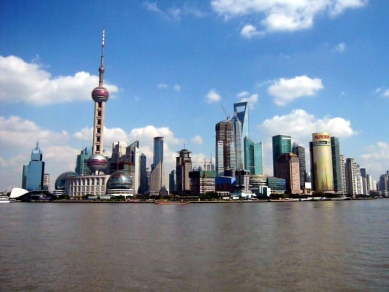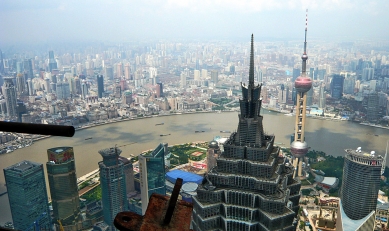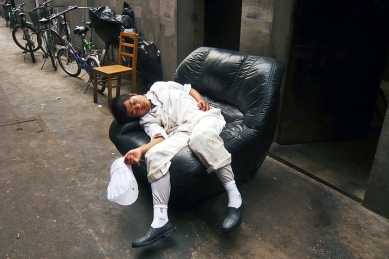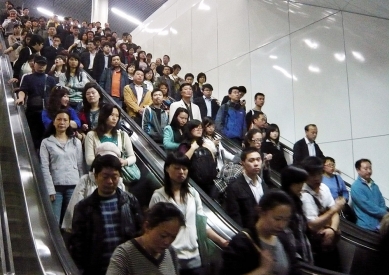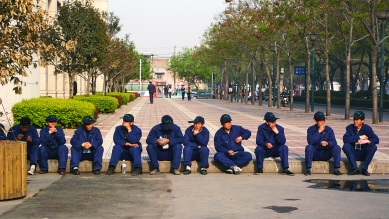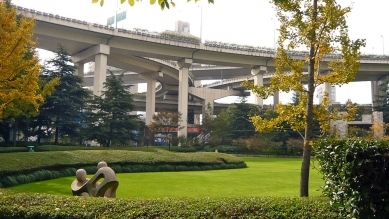
Interview with Eva Le Peutrec
Czech architects in China
With the opening of borders and unlimited travel opportunities, it's no longer unusual for students or architects to settle in some foreign office, but China still feels exotic to most of us, and we learn about its boom through media. What circumstances brought you here?
To begin, I should mention that I am a very adventurous person and I am attracted to challenges. China was not the first destination where I stayed long-term. I previously spent two years in San Francisco (USA), where I worked at the architectural firm Cee Architects. I was there as part of a required annual school internship and extended it for another year. My studies at university were preceded by several months in London, where I studied English.
When I was deciding what to do next in my last semester of studies, Asia naturally attracted me, a place that is very exotic and also where the most construction is happening. I dived into my plan headfirst and found a job in Shanghai online in a very short time. I flew into the unknown, to a twenty-million city where I didn’t know anyone personally, couldn’t communicate, with the prospect of working for a Chinese company that didn’t even have a website in English at the time, thus it was untraceable by normal internet search engines. My bosses talked about my courage, or rather madness, for a long time afterwards.
I have never experienced the Asian mentality firsthand, but from a European perspective, I appreciate that films there are not as easily predictable as 'Hollywood blockbusters' and can be unsolvable until the very end. What is it like to get to know and live with Chinese customs?
There could be a whole book written about the cultural differences between Europeans and Asians. Here I will summarize at least some aspects I have dealt with, and even after almost four years of staying, they still remain relevant in my everyday life.
I consider the most significant difference to be the different way of thinking. Chinese society does not operate on the principles of logic, as we are used to in Europe or America. This topic is not widely published, so every foreigner upon arrival is completely thrown off and doesn’t understand what is happening. For a long time, I explained this fact by the different cultural development, (the connection of European civilization with Greece as the cradle of logical thinking), but it wasn’t until recently that I uncovered the true essence of the matter. Europeans and Americans predominantly use their left hemisphere (the left side of the brain) for thinking, whereas Chinese people use their right. Chinese characters have a pictographic form and in spoken form, they distinguish four different tones in Mandarin pronunciation and even nine tones in Cantonese. They are processed by the right hemisphere. Western languages mostly have only one tone for each word, hence they are processed by the left hemisphere. This has a fundamental impact on the thinking of nations.
Therefore, Chinese thinking is not analytical, based on logic; they are unable to plan, they don't perceive time in the same way, and they are not systematic, organized, and they listen more to how something is said rather than what is said; they arrange information differently than we are accustomed to.
Participating in this game is extremely frustrating at first but ultimately very beneficial. It forces you to think differently, to push your limits.
It also changes your perspective on architecture.
If we look at architecture as the organization, grouping, and alignment of elements, we suddenly begin to discover new solutions that wouldn’t have occurred to us before.
This is just one aspect of cultural differences. I could also mention the inability to read emotions from the faces of Chinese people, which is influenced by Taoism, teaching them to maintain a neutral stance, not to show sadness, joy, anger, ....
Among other very important differences is the preservation of 'face'. For Chinese people, and for Asians in general, maintaining dignity is more important than life itself. This must be considered in any conflicting situation. It can lead to the loss of jobs, clients, friendships, ... Therefore, I would not recommend anyone to joke at someone else's expense, as we are used to in Europe.
Furthermore, there is a language barrier. You cannot communicate, you are unable to read or deduce things as we are used to from Romance languages. When you are fortunate enough to meet someone who speaks English, you must engage a good dose of imagination. Chinese people hardly ever use verbs and do not differentiate between the pronouns he and she. Moreover, there is often inaccurate pronunciation, and in the end, it is almost irrelevant whether the person speaks to you in Chinese or English.
In desperation, you may resort to sign language with hand gestures, but even that won’t help you, since for example, basic numbers are expressed differently than we are used to. If you want to express the number 2 using your fingers, they will understand 7, etc.
On the other hand, young Africans dream of becoming European footballers and Japanese teenagers rebelling against conventions adore everything European. How is the perception of European culture among the groups you have been able to encounter?
Among Chinese people, the obsession with Western civilization and culture is very noticeable. In my opinion, this is linked to the tradition of preserving dignity and the necessity to always present oneself in the best possible light to the surroundings. Since the younger and middle generations are bombarded by advertisements and the film industry from the West, we cannot be surprised that Chinese people have started to drink coffee on a large scale, although they dislike it. They travel to subtropical lands, although they cannot stand the sun, learn to play the piano, or undergo plastic surgeries on their eyes to come closer to the European ideal of beauty. The popularity of branded clothing is a chapter in itself.
I believe that all of this is just a cover for internal insecurity caused by the Cultural Revolution. It is certainly safer to copy not very successful foreign models than to seek one's own identity and risk failure. In importing foreign schemes, I see a certain parallel with the post-revolutionary period of the 1990s in the Czech Republic, although on a much smaller scale. (To give an idea, I could name the satellite towns that have overrun the Czech countryside, villas in the style of business baroque, .....)
In Shanghai, the so-called Czech Quarter was created with the help of Petr Franta and Vlado Milunić. In this case, it is more about transforming the idyllic ideas of one influential Chinese entrepreneur into the historical center of Prague than about a full representation of Czech culture. If you would like to comment on the project, I would be more interested in how and whether our small country can offer anything to China?
I would not want to comment on the project by P. Franta and V. Milunić because I have not seen it with my own eyes, but let us focus on the possible contribution of Czechs to China. One of the most valuable qualities of Czechs is the ability to improvise. This trait is crucial for survival in China. Life here is incredibly fast-paced and based on different principles. The only certainty you can have is change. The ability to react promptly is essential. Improvisation goes hand in hand with creativity and creative thinking. The ability to find new and fresh solutions is something Czechs are familiar with. I would consider this as the main advantages that Czechs can offer to China.
Another area in which not only Czechs but foreigners in general can significantly contribute to China is the perception of details. I believe that Chinese people, due to their right-hemisphere thinking, are more oriented toward the whole; details are not so important to them. This means that a mere approach to a good result is sufficient. This is particularly evident in construction, where all finishing work is done very poorly. The Chinese viewpoint, if it looks good from a distance, why should we concern ourselves with details is very typical. Providing higher quality products can be the foundation of an entire company strategy, as the company I work for does. Recently, quality has started to play a more important role. The government also realizes that it is not very appropriate to churn out low-quality products to the world. The scope of possibilities in this area is very broad for foreigners.
Germany, which takes its own architects along with its car manufacturers and other industrial firms to China, could serve as an example; we could also look at the Netherlands. This small country offers China its urban know-how. Do we have anything to offer in this regard?
In my opinion, we shouldn’t be asking what we can offer, but rather what we can learn. We are at a moment that will never repeat itself. It is a tremendous challenge and offers an unprecedented opportunity. Architecture is about exploration. We should be as open as possible and use the different cultural environment to expand our horizons.
The book The Chinese Dream by Dutch architect Mars Neville comes with the fact that in the next twenty years, twenty completely new million-person cities will be built in China, as well as with the theory of densification to accommodate 400 million new urban residents. How much attention is paid to planning and sustainable development in China? Is everything being created too chaotically and without regard for the future?
It is being created, but it should be noted that Chinese people do not perceive time in the same way as we do. Their calendar is lunar, based on the cycles of nature, not the Roman one like ours. Therefore, neither the future nor planning is so important to them. If you buy an apartment in China today, you will own it for 80 years and then it will revert to the state; for hotel-type apartments, it is merely 50 years. Houses here are not built with the same ambition as in Europe to last for centuries; it is more a matter of the short term.
Densification of cities is a bare necessity, as vast suburbs take away fertile land. Government officials realize that in the future there will not be enough land to produce food for all residents, and thus China will become dependent on imports from abroad. However, in practice, they still cling to old nonsensical planning models from the beginning of the last century, such as zoning. This brings, among other things, complications in transportation. They also use their specific regulations, such as the necessity for north-south orientation of residential buildings. This makes designing blocks (as we know from Europe) impossible and creates endless rows of houses with unusable space between them. With such a scheme, densification is impossible, as the building law requires a minimum of 1.5 hours of sunlight for each apartment. This regulation has changed the face of the entire country. It can be very well observed from the airplane when you realize the real scale of the problem.
It must also be understood that in one year, China goes through roughly the same development that Europe does in ten years. The stage of making mistakes probably cannot be skipped. It's only a matter of ensuring that mistakes do not border on ecological catastrophe, as often entire ecosystems change and landscapes are degraded.
There are various reports about the industriousness of Chinese people. One is that they work ten times more efficiently for a tenth of the pay than people in Europe or America. Another point of contention is the quality of products, defectiveness of production, and copyright issues. I understand that with such immense economic development, which has no comparison in history, it is impossible to oversee everything. The Chinese government is gradually being pushed to take necessary steps by external influences. It fascinates me that in China not only are patents or small components copied, but also cars or entire skyscrapers. These are all exaggerated stories from the media and sometimes even stereotypical prejudices. How do you view things right on the ground?
Copying is one of the things that personally affects me a lot. I encounter it daily in our office. We often have to deliver two different design options to the client. After the first presentation, or often even earlier, upon looking at my monitor, my Chinese colleagues literally copy my scheme. The result is two very similar designs. Other times, one of my older projects serves as a template for them. In my opinion, Chinese people are not creative; they do not design; they merely assemble elements that they see in pictures in books or on the internet.
However, they often shamelessly copy entire entities. The necessity to copy may be encoded in them since their study days when they learn individual characters through endless tracing. The more accurately they copy, the more praise they receive.
My colleagues spend a lot of time at work, but that doesn’t mean they are always productive. Particularly at the beginning of a project, when important decisions must be made, it’s hard to talk about work efficiency. Later, when it’s necessary to draft the project, their productivity rises sharply. In the initial phases of a project, I am usually 3-4 times more efficient than my Chinese colleagues. But this is a very individual matter; I cannot claim that all foreign architects are more efficient than our Chinese colleagues. If the problem is strictly defined, Chinese people are very efficient. However, if the assignment is too vague and requires personal interpretation, a Chinese person becomes uncertain and, fearing that they might not understand the task correctly, would rather do nothing. In my opinion, this originates from the Chinese educational system, where students are forced to accept a single correct interpretation instead of forming their own judgment.
The information that Chinese people work ten times more for a tenth of the pay than people in Europe is a cliché that I would like to debunk. Recently, Chinese workers are becoming expensive labor, which is causing investors to shift to other Southeast Asian countries.
Instead of your maiden name, you now use the surname Le Peutrec after your husband, which suggests that your ties to foreign countries are so strong that you do not plan to return to your home country in the near future. Last year, I studied the young Slovenian scene in Ljubljana, and its successful advance lay precisely in the fact that after gaining foreign experience, they returned to pass on their experiences by elevating the level of local architecture. What are your approximate plans for the future?
Life in Shanghai is so fast-paced and diverse that each month brings you new offers and opportunities, making it almost impossible to plan for a longer time. Additionally, it is necessary to combine the careers of two people, which is not easy, especially when one partner is not of the same nationality and does not have the same profession as you. I feel very close to the Czech Republic and enjoy returning there, but I consider a return to the Czech Republic in the near future to be quite unrealistic. This is also due to the current economic crisis, which has affected Europe to a greater extent than Asia; we will stay in China for some time longer.
I considered the change of my maiden name from Hendrychová to be natural after marriage, and I must admit that it has made many things easier for me. Thanks to the suffix -ová, both in the USA and in China, I was considered a citizen of Russian nationality, although the origin of the name Hendrych comes from Northern Europe. The name Le Peutrec is an old Breton name of Celtic origin, which I find very appealing.
Thank you for sharing your experiences from faraway China with our readers.
To begin, I should mention that I am a very adventurous person and I am attracted to challenges. China was not the first destination where I stayed long-term. I previously spent two years in San Francisco (USA), where I worked at the architectural firm Cee Architects. I was there as part of a required annual school internship and extended it for another year. My studies at university were preceded by several months in London, where I studied English.
When I was deciding what to do next in my last semester of studies, Asia naturally attracted me, a place that is very exotic and also where the most construction is happening. I dived into my plan headfirst and found a job in Shanghai online in a very short time. I flew into the unknown, to a twenty-million city where I didn’t know anyone personally, couldn’t communicate, with the prospect of working for a Chinese company that didn’t even have a website in English at the time, thus it was untraceable by normal internet search engines. My bosses talked about my courage, or rather madness, for a long time afterwards.
I have never experienced the Asian mentality firsthand, but from a European perspective, I appreciate that films there are not as easily predictable as 'Hollywood blockbusters' and can be unsolvable until the very end. What is it like to get to know and live with Chinese customs?
There could be a whole book written about the cultural differences between Europeans and Asians. Here I will summarize at least some aspects I have dealt with, and even after almost four years of staying, they still remain relevant in my everyday life.
I consider the most significant difference to be the different way of thinking. Chinese society does not operate on the principles of logic, as we are used to in Europe or America. This topic is not widely published, so every foreigner upon arrival is completely thrown off and doesn’t understand what is happening. For a long time, I explained this fact by the different cultural development, (the connection of European civilization with Greece as the cradle of logical thinking), but it wasn’t until recently that I uncovered the true essence of the matter. Europeans and Americans predominantly use their left hemisphere (the left side of the brain) for thinking, whereas Chinese people use their right. Chinese characters have a pictographic form and in spoken form, they distinguish four different tones in Mandarin pronunciation and even nine tones in Cantonese. They are processed by the right hemisphere. Western languages mostly have only one tone for each word, hence they are processed by the left hemisphere. This has a fundamental impact on the thinking of nations.
Therefore, Chinese thinking is not analytical, based on logic; they are unable to plan, they don't perceive time in the same way, and they are not systematic, organized, and they listen more to how something is said rather than what is said; they arrange information differently than we are accustomed to.
Participating in this game is extremely frustrating at first but ultimately very beneficial. It forces you to think differently, to push your limits.
It also changes your perspective on architecture.
If we look at architecture as the organization, grouping, and alignment of elements, we suddenly begin to discover new solutions that wouldn’t have occurred to us before.
This is just one aspect of cultural differences. I could also mention the inability to read emotions from the faces of Chinese people, which is influenced by Taoism, teaching them to maintain a neutral stance, not to show sadness, joy, anger, ....
Among other very important differences is the preservation of 'face'. For Chinese people, and for Asians in general, maintaining dignity is more important than life itself. This must be considered in any conflicting situation. It can lead to the loss of jobs, clients, friendships, ... Therefore, I would not recommend anyone to joke at someone else's expense, as we are used to in Europe.
Furthermore, there is a language barrier. You cannot communicate, you are unable to read or deduce things as we are used to from Romance languages. When you are fortunate enough to meet someone who speaks English, you must engage a good dose of imagination. Chinese people hardly ever use verbs and do not differentiate between the pronouns he and she. Moreover, there is often inaccurate pronunciation, and in the end, it is almost irrelevant whether the person speaks to you in Chinese or English.
In desperation, you may resort to sign language with hand gestures, but even that won’t help you, since for example, basic numbers are expressed differently than we are used to. If you want to express the number 2 using your fingers, they will understand 7, etc.
On the other hand, young Africans dream of becoming European footballers and Japanese teenagers rebelling against conventions adore everything European. How is the perception of European culture among the groups you have been able to encounter?
Among Chinese people, the obsession with Western civilization and culture is very noticeable. In my opinion, this is linked to the tradition of preserving dignity and the necessity to always present oneself in the best possible light to the surroundings. Since the younger and middle generations are bombarded by advertisements and the film industry from the West, we cannot be surprised that Chinese people have started to drink coffee on a large scale, although they dislike it. They travel to subtropical lands, although they cannot stand the sun, learn to play the piano, or undergo plastic surgeries on their eyes to come closer to the European ideal of beauty. The popularity of branded clothing is a chapter in itself.
I believe that all of this is just a cover for internal insecurity caused by the Cultural Revolution. It is certainly safer to copy not very successful foreign models than to seek one's own identity and risk failure. In importing foreign schemes, I see a certain parallel with the post-revolutionary period of the 1990s in the Czech Republic, although on a much smaller scale. (To give an idea, I could name the satellite towns that have overrun the Czech countryside, villas in the style of business baroque, .....)
In Shanghai, the so-called Czech Quarter was created with the help of Petr Franta and Vlado Milunić. In this case, it is more about transforming the idyllic ideas of one influential Chinese entrepreneur into the historical center of Prague than about a full representation of Czech culture. If you would like to comment on the project, I would be more interested in how and whether our small country can offer anything to China?
I would not want to comment on the project by P. Franta and V. Milunić because I have not seen it with my own eyes, but let us focus on the possible contribution of Czechs to China. One of the most valuable qualities of Czechs is the ability to improvise. This trait is crucial for survival in China. Life here is incredibly fast-paced and based on different principles. The only certainty you can have is change. The ability to react promptly is essential. Improvisation goes hand in hand with creativity and creative thinking. The ability to find new and fresh solutions is something Czechs are familiar with. I would consider this as the main advantages that Czechs can offer to China.
Another area in which not only Czechs but foreigners in general can significantly contribute to China is the perception of details. I believe that Chinese people, due to their right-hemisphere thinking, are more oriented toward the whole; details are not so important to them. This means that a mere approach to a good result is sufficient. This is particularly evident in construction, where all finishing work is done very poorly. The Chinese viewpoint, if it looks good from a distance, why should we concern ourselves with details is very typical. Providing higher quality products can be the foundation of an entire company strategy, as the company I work for does. Recently, quality has started to play a more important role. The government also realizes that it is not very appropriate to churn out low-quality products to the world. The scope of possibilities in this area is very broad for foreigners.
Germany, which takes its own architects along with its car manufacturers and other industrial firms to China, could serve as an example; we could also look at the Netherlands. This small country offers China its urban know-how. Do we have anything to offer in this regard?
In my opinion, we shouldn’t be asking what we can offer, but rather what we can learn. We are at a moment that will never repeat itself. It is a tremendous challenge and offers an unprecedented opportunity. Architecture is about exploration. We should be as open as possible and use the different cultural environment to expand our horizons.
The book The Chinese Dream by Dutch architect Mars Neville comes with the fact that in the next twenty years, twenty completely new million-person cities will be built in China, as well as with the theory of densification to accommodate 400 million new urban residents. How much attention is paid to planning and sustainable development in China? Is everything being created too chaotically and without regard for the future?
It is being created, but it should be noted that Chinese people do not perceive time in the same way as we do. Their calendar is lunar, based on the cycles of nature, not the Roman one like ours. Therefore, neither the future nor planning is so important to them. If you buy an apartment in China today, you will own it for 80 years and then it will revert to the state; for hotel-type apartments, it is merely 50 years. Houses here are not built with the same ambition as in Europe to last for centuries; it is more a matter of the short term.
Densification of cities is a bare necessity, as vast suburbs take away fertile land. Government officials realize that in the future there will not be enough land to produce food for all residents, and thus China will become dependent on imports from abroad. However, in practice, they still cling to old nonsensical planning models from the beginning of the last century, such as zoning. This brings, among other things, complications in transportation. They also use their specific regulations, such as the necessity for north-south orientation of residential buildings. This makes designing blocks (as we know from Europe) impossible and creates endless rows of houses with unusable space between them. With such a scheme, densification is impossible, as the building law requires a minimum of 1.5 hours of sunlight for each apartment. This regulation has changed the face of the entire country. It can be very well observed from the airplane when you realize the real scale of the problem.
It must also be understood that in one year, China goes through roughly the same development that Europe does in ten years. The stage of making mistakes probably cannot be skipped. It's only a matter of ensuring that mistakes do not border on ecological catastrophe, as often entire ecosystems change and landscapes are degraded.
There are various reports about the industriousness of Chinese people. One is that they work ten times more efficiently for a tenth of the pay than people in Europe or America. Another point of contention is the quality of products, defectiveness of production, and copyright issues. I understand that with such immense economic development, which has no comparison in history, it is impossible to oversee everything. The Chinese government is gradually being pushed to take necessary steps by external influences. It fascinates me that in China not only are patents or small components copied, but also cars or entire skyscrapers. These are all exaggerated stories from the media and sometimes even stereotypical prejudices. How do you view things right on the ground?
Copying is one of the things that personally affects me a lot. I encounter it daily in our office. We often have to deliver two different design options to the client. After the first presentation, or often even earlier, upon looking at my monitor, my Chinese colleagues literally copy my scheme. The result is two very similar designs. Other times, one of my older projects serves as a template for them. In my opinion, Chinese people are not creative; they do not design; they merely assemble elements that they see in pictures in books or on the internet.
However, they often shamelessly copy entire entities. The necessity to copy may be encoded in them since their study days when they learn individual characters through endless tracing. The more accurately they copy, the more praise they receive.
My colleagues spend a lot of time at work, but that doesn’t mean they are always productive. Particularly at the beginning of a project, when important decisions must be made, it’s hard to talk about work efficiency. Later, when it’s necessary to draft the project, their productivity rises sharply. In the initial phases of a project, I am usually 3-4 times more efficient than my Chinese colleagues. But this is a very individual matter; I cannot claim that all foreign architects are more efficient than our Chinese colleagues. If the problem is strictly defined, Chinese people are very efficient. However, if the assignment is too vague and requires personal interpretation, a Chinese person becomes uncertain and, fearing that they might not understand the task correctly, would rather do nothing. In my opinion, this originates from the Chinese educational system, where students are forced to accept a single correct interpretation instead of forming their own judgment.
The information that Chinese people work ten times more for a tenth of the pay than people in Europe is a cliché that I would like to debunk. Recently, Chinese workers are becoming expensive labor, which is causing investors to shift to other Southeast Asian countries.
Instead of your maiden name, you now use the surname Le Peutrec after your husband, which suggests that your ties to foreign countries are so strong that you do not plan to return to your home country in the near future. Last year, I studied the young Slovenian scene in Ljubljana, and its successful advance lay precisely in the fact that after gaining foreign experience, they returned to pass on their experiences by elevating the level of local architecture. What are your approximate plans for the future?
Life in Shanghai is so fast-paced and diverse that each month brings you new offers and opportunities, making it almost impossible to plan for a longer time. Additionally, it is necessary to combine the careers of two people, which is not easy, especially when one partner is not of the same nationality and does not have the same profession as you. I feel very close to the Czech Republic and enjoy returning there, but I consider a return to the Czech Republic in the near future to be quite unrealistic. This is also due to the current economic crisis, which has affected Europe to a greater extent than Asia; we will stay in China for some time longer.
I considered the change of my maiden name from Hendrychová to be natural after marriage, and I must admit that it has made many things easier for me. Thanks to the suffix -ová, both in the USA and in China, I was considered a citizen of Russian nationality, although the origin of the name Hendrych comes from Northern Europe. The name Le Peutrec is an old Breton name of Celtic origin, which I find very appealing.
Thank you for sharing your experiences from faraway China with our readers.
The English translation is powered by AI tool. Switch to Czech to view the original text source.
